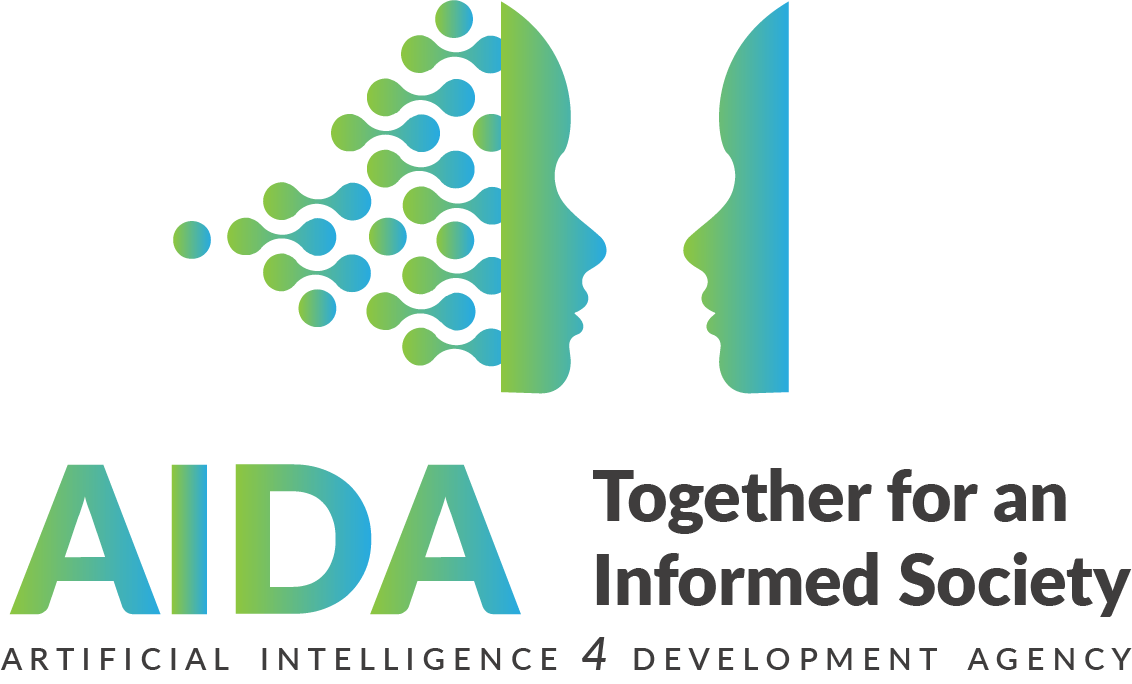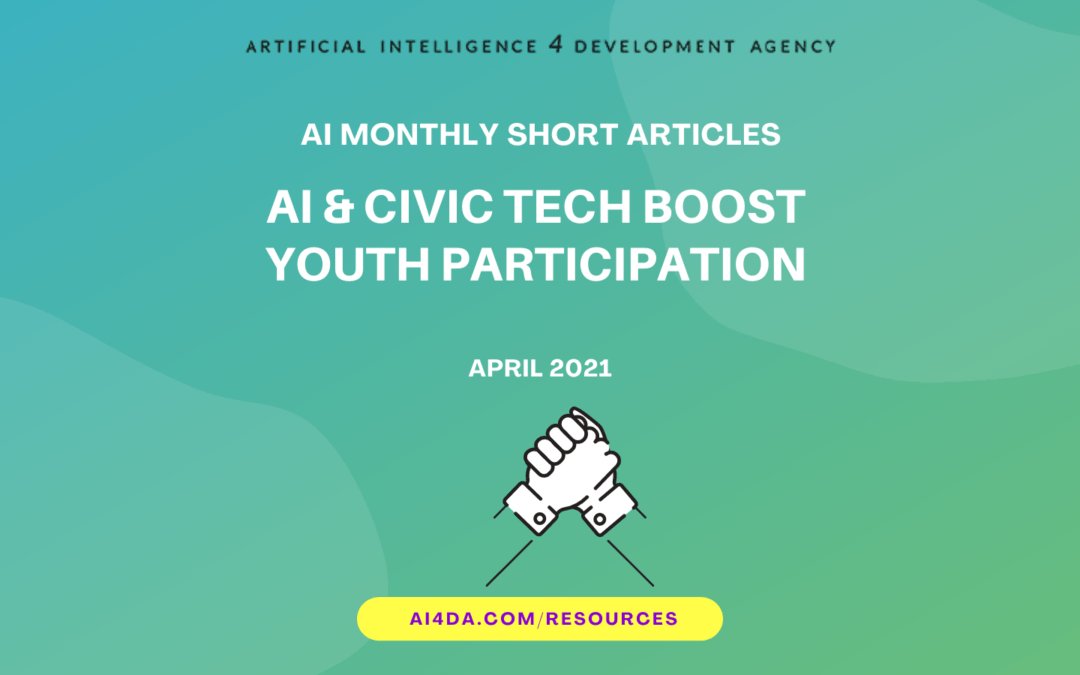How can AI-based civic tech boost youth participation
Technological advances have proven to make a difference in all areas of life, and democratic participation is no exception. The increased development of solutions meant for all levels of government have proven to bring efficiency to public sector service provision as well as more rational management of resources. According to estimates provided by Deloitte, the use of AI in Government can save up to 30% of government employees time and save nearly 41 billion USD of taxpayers money worldwide [1]. But can the use of AI based civic tech enable better communication and meaningful participation of citizens and especially youth in the decision making processes?
What is AI-based civic tech and why does it matter?
The notion of civic tech is commonly defined as “technologies that are deployed to enhance the relationship between people and government, by giving people more of a voice to participate in public decision making and/or to improve the delivery of services to people” [2].
Although the use of AI based civic tech has enormous potential, the events from 2016 US elections, involving harvesting millions of people’s profiles for the purpose of building models and influence their election choice [3], have raised the level of scepticism and disbelief. On the other hand, there are numerous examples of good practice, where AI based civic tech solutions demonstrated their positive impact.
How can AI advance civil participation?
Within the area of enhancing civil participation we find the CitizenLab platform, where the organization Youth4Climate received a great number of ideas from youth around the world aimed to combat climate change, after which the platform used its automated analysis feature to transform the ideas into meaningful recommendations and actions. During this process, CitizenLab dedicated great attention to ethics and transparency in the process by taking measures to avoid and anticipate bias and ensure inclusivity regardless of the language used (platforms’s NLP feature) [4].
Another positive example is the Ushahidi platform, which collects crowdsourced data and targeted survey responses from multiple data sources. The aim of the platform is to enable users to interact, communicate, and collect data by using the same technology as their stakeholders, in order to reduce obstacles for meaningful participation in the decision making process. The source code of the platform is open and posted in GitHub, which makes the use of the platform highly inclusive and accessible [5].
Pushing accountability through AI
The promotion of democratic values can also be applied to other areas such as making the public administration more accountable. With this aim a diverse group of individuals created “Operaçao Seranata de amor” [6] in Brazil. This project uses an AI, named Rosie, to oversee public spending which is then made public and accessible to everyone to prompt government’s accountability and stop corruption. The key to their success has been to make the data they gather easily accessible in “a simple and uncomplicated way” through the website Jarbas [7] . It started at the national level but the project is expanding to the local level, with the overseeing of Brazilian cities with “Querido Diário” [8].
Better informed individuals with the help of AI
Another important democratic premise is reliable information so individuals can act and decide in an informed manner. In this sense there are initiatives such as the Italian CITBot [9]which uses a chatbot to promote citizen participation which they describe like a “personal assistant for civil liberties”. It was created by Associazione Luca Coscioni and developed by Revevol in Italy and it has scaled up to the EU level thanks to a collaboration with EUMANS. The idea is for the chatbot to help European citizens take on concrete actions and also enforce their political rights at the Union and at their local level through a dialogue with the AI which informs about key democratic issues such as how to submit a petition to the EU or how to get involved in politics, for instance.
Within the private sector there are some startups which have taken an ethical use of AI as their core of their business. This is the case of Factmata [10] a start-up providing technological solutions that aim to counteract eco chambers, fake news and propaganda. Factmata fights against disinformation by working with brands, platforms and agencies through providing them with moderation and an API (Application Programming Interface). The moderation option helps destinataries be more trusted by helping them associate with safe content as well as assisting them in flagging suspicious content. On the other hand, Factmata’s API’s mission is for partners to understand the quality, safety and credibility of online content through a scoring system.
Written by: Ariadna Carrascosa & Bogdan Banjac
References
[1] “How Much Time and Money Can AI Save Government?,” Deloitte Insights, accessed April 14, 2021, https://www2.deloitte.com/us/en/insights/focus/cognitive-technologies/artificial-intelligence-government-analysis.html.
[2] Quora. “What Is Civic Technology?,” Forbes (Forbes Magazine, September 19, 2017), https://www.forbes.com/sites/quora/2017/09/19/what-is-civic-technology/?sh=6a3cfb6c3ecc.
[3] “Revealed: 50 Million Facebook Profiles Harvested for Cambridge Analytica in Major Data Breach,” The Guardian (Guardian News and Media, March 17, 2018), https://www.theguardian.com/news/2018/mar/17/cambridge-analytica-facebook-influence-us-election.
[4] Coline Cuau. “Artificial Intelligence and Citizen Participation, a Case-Study,” CitizenLab’s Blog, May 28, 2019, https://www.citizenlab.co/blog/civic-engagement/youth-for-climate-case-study/.
[5] “How the Ushahidi Platform Works, and What Comes Next,” Ushahidi, accessed April 14, 2021, https://www.ushahidi.com/blog/2018/11/05/how-the-ushahidi-platform-works-and-what-comes-next.
[6] Musskopf, Irio. “Operaçao Serenata de Amor”. Accessed April 12, 2021 https://serenata.ai
[7] Operaçao Serenata de Amor. “Jarbas Database”. Accessed April 12, 2021 https://jarbas.serenata.ai/
[8] Open Knowledge Brazil. “Querido Diário”. Accessed April 12, 2021https://queridodiario.ok.org.br/
[9] Eumans. “Citbot”. Accessed 12th April 2021 https://eumans.eu/citbot-participatory-democracy
And Coscioni, Luca. “Citbot”. Accessed April 12, 2021https://citbot.it
[10] Factmata. “Factmata”. Accessed April 12, 2021 http://factmata.com/

